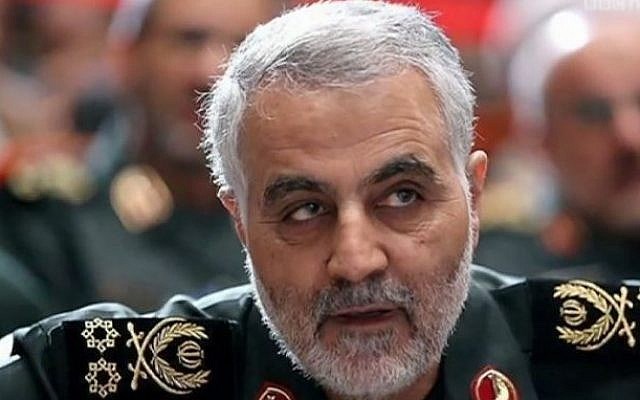Time of Israel
Friday October 4, 2019

Iranian Revolutionary Guards’ Quds Force commander Maj. Gen. Qassem Soleimani. (YouTube screenshot)
Three arrested in plan that allegedly involved blowing up Qassem Soleimani during a memorial service for his father
Iran thwarted what it described as an “Israel-Arab” plot to assassinate General Qassem Soleimani, the head of the elite Quds Force in Iran’s Islamic Revolutionary Guard Corps, Iranian media reported Thursday.
The Guard’s intelligence chief, Hossein Taeb, told an annual conference of IRGC commanders that three people had been arrested in connection with the plan.
Taeb said the plot had been worked on for a number of years and involved blowing up Soleimani at a memorial service for his father during the Muslim holy month of Muharram, which begin in early September, the semi-official Fars news agency reported.
The assassins planned to dig under a religious site associated with Soleimani’s father and set off an explosion under the building when he was inside, and then try to deflect blame so that it ignited an interfaction religious war.
The assassins prepared some 500 kilograms to use for the bomb, Taeb revealed. He did not name any specific Arab country as being involved in the alleged plan.
Israel has over the last few years intensified its outreach to Arab countries, especially in the Gulf, amid rising tensions with Iran, a common enemy. Clandestine relations between Israel and Saudi Arabia focus mainly on security issues, especially given the mutual enmity to Iran, is well-known.
On Tuesday Soleimani claimed that Israeli aircraft targeted him and the leader of the Iran-backed Hezbollah terror group, Hassan Nasrallah, in Beirut during the Second Lebanon War in 2006.
He said that one night he, Nassrallah, and senior Hezbollah commander Imad Mughniyeh left an operations center in Beirut during an Israeli bombardment and were tracked by drones, which they eventually managed to evade.
Soleimani, who is responsible for armed Iranian activities outside the country’s borders, made the Tuesday comments during his first major interview, a lengthy one-on-one that was screened on Iranian television.
Mughniyeh was later was assassinated in 2008 by a car bomb attributed to Israel and the CIA.
Israel has increasingly been targeting Iranian-allied forces in the region in recent years, as Tehran has sought to establish a military foothold in war-ravaged Syria.
Tensions have risen in the Persian Gulf since May last year when US President Donald Trump unilaterally abandoned a 2015 nuclear deal between major powers and Iran and began reimposing crippling sanctions in a campaign of “maximum pressure.” Iran has responded in recent months by reducing its own commitments under the deal and the US deployed military assets to the region.
Things escalated further after attacks last month on Saudi oil facilities that halved the kingdom’s oil output. Yemen’s Houthi rebels have claimed responsibility for the strikes but the US says it has concluded the attacks involved cruise missiles from Iran and amounted to “an act of war.”
Saudi Arabia, which has been bogged down in a five-year war across its southern border in Yemen, has said Iran “unquestionably sponsored” the attacks.
Iran has denied responsibility for the September 14 drone and cruise missile attack.













